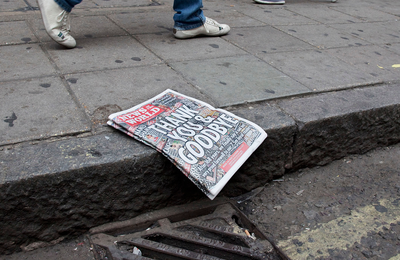It is 10 years since the big phone-hacking trial ended at the Old Bailey. Ex-News of the World editor Andy Coulson went to prison; ex-News International chief Rebekah Brooks walked free. It was the climax of a scandal that provoked seven police inquiries into the interception of communications, into bribery and into the theft of data on behalf of some of Britain’s most powerful newspapers—but it was not the end.
Since then, hundreds of victims have gone to the civil courts to sue not only Rupert Murdoch’s UK company but also Mirror Group Newspapers and Associated Newspapers, which owns the Daily Mail. With the rare exception of Prince Harry in his case last year against MGN, none of them has been able to afford to go to a full trial, but many of them have been able to persuade the High Court to order disclosure of material from police files and, more importantly, from the inner records of the news organisations. The claimants have now amassed a trove of new evidence including emails, call data, records of payments to private investigators, agenda notes, minutes of meetings and recordings of intercepted voicemail messages. Some of this has been deployed in open court. Much of the evidence in relation to the Murdoch papers is due to be deployed at an eight-week trial scheduled for January next year.
It is essential to say that, although some 1,600 cases have been settled with the payment of damages, much of this new evidence consists of unproven allegations. The news organisations contest many of the alleged facts as well as the inferences on which the claimants are resting their cases. It will fall to the Metropolitan Police and the Crown Prosecution Service to check the reality of the new evidence, to decide whether any of it is strong enough to warrant opening an investigation and, if so, whether it would be right to bring any charges against any of those alleged to be involved in unlawful behaviour.
What follows is the story of the evidence that is waiting to be examined, in addition to what was already known 10 years ago. Ultimately, it is a tale not only about the behaviour of the press, but also about the behaviour of power.
The Spy Papers part one: Did the Murdoch empire hack MPs for commercial ends?
Part two: How Murdoch’s company magicked away 31 million emails
Part three: What did Rupert Murdoch know, when?
Part four: Exposed: How powerful newspapers hacked phones during Leveson
Part five: How the Murdoch company ‘bought silence’ after phone hacking
Part six: Did Washington Post publisher ‘pervert the course of justice’ under Murdoch?
Part seven: Piers Morgan’s phone-hacking denial: still utterly unpersuasive
Part eight: The corruption of the Press Complaints Commission
News Group Newspapers—a Murdoch company—has responded to our articles with additional clarifications and answers which we have appended or inserted into the relevant articles. In addition, following a High Court judgment of 21st May concerning amendments to the claimants' case, the company issued a statement, an extract of which is published below:
“The Court in its Judgment on 21st May thoroughly vindicated NGN's position at the hearing in March and did not give permission to introduce large and significant portions of the [claimants’] amendments, many of which were featured in the Prospect articles.
Mr Justice Fancourt said in his Judgment (at para 79): “...there is a desire on the part of those running the litigation on the claimants’ side to shoot at ‘trophy targets’, whether those are political issues or high-profile individuals.” He stated that this cannot become "an end in itself" and has recognised the intention of the Claimants to make amendments for "collateral reasons" that do not further the proceedings. NGN stated that such "collateral reasons" are primarily aimed at giving publicity to allegations against NGN executives.
The articles published in Prospect on this matter rely in large part on inaccurate and disputed allegations, many of which have explanations and would have been responded to had it become necessary to serve a full defence. Many similar allegations were previously tested in the criminal courts or investigated by the police and the CPS between 2011-15.
The use of draft pleadings without proper balance in this way is highly questionable. NGN and individuals accused were not given a realistic right to reply before publication and indeed it would have been impossible and inappropriate to do so in a matter of this complexity.
We urge considerable caution in accepting the allegations made against NGN (as well as against some former and current staff) in the series of articles.”













